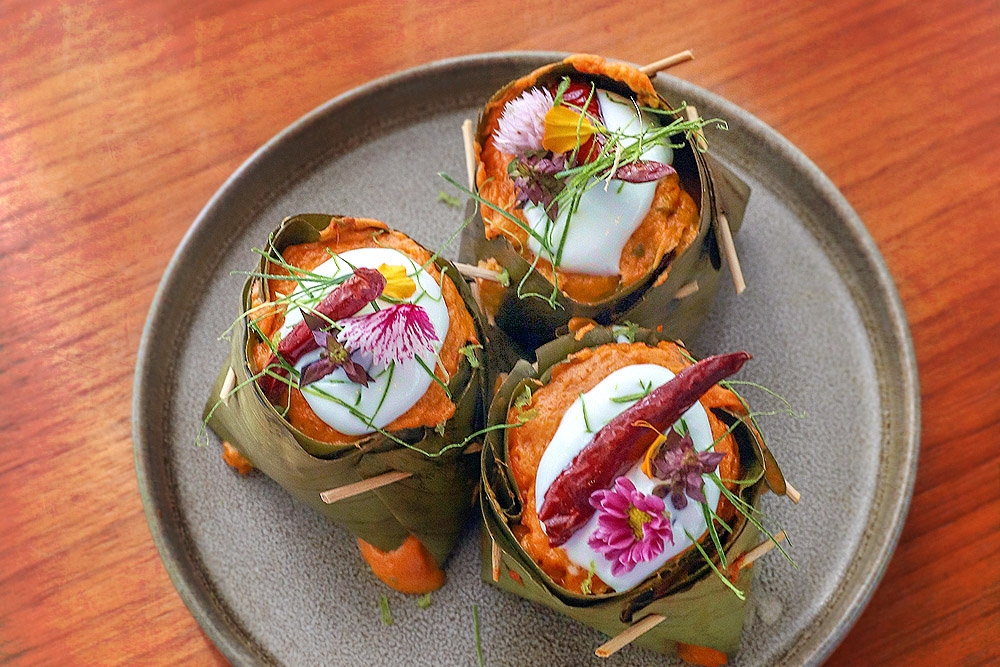
KUALA LUMPUR, Aug 23 – Tucked neatly within a banana leaf parcel, the pale custard quivers at the slightest nudge. We taste sweet prawn and fish; coconut cream perfumed by lemongrass and galangal; the warmth of red curry paste.
This is Amok Trei, Cambodia’s fish and prawn custard in a spiced coconut curry, served at Oolam in The Five, Damansara Heights.
Here, under the direction of Chef Rakesh Varma, South-east Asian flavours take centrestage: turmeric and tamarind, betel leaves and palm sugar, not to mention the beautifully unapologetic funk of fermented fish sauce.
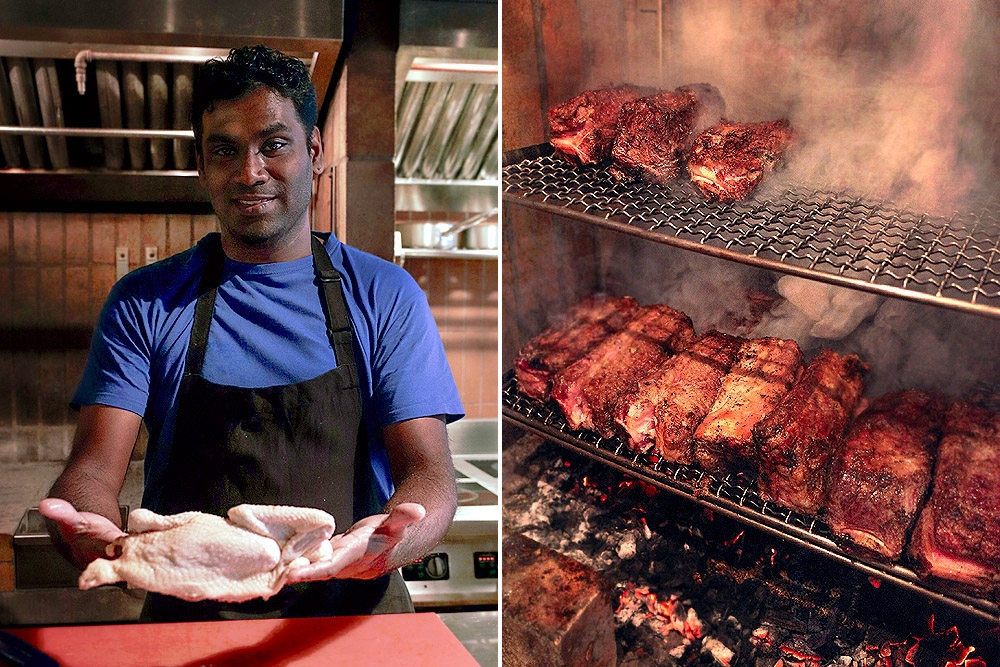
Chef Rakesh Varma (left). Urap Pucuk Paku with Pegaga (right).
Chef Rakesh shares, “We draw mainly from Thai, Vietnamese and Laotian cuisines. Some dishes are recognisable, others more offbeat, but all are designed to ease diners into what Oolam is about: bold, honest South-east Asian flavours presented with care and intention.”
His own care for the craft began early, helping his mother in the kitchen. Sixteen years on, his career has included formative stints with David Thompson of Long Chim, Sydney, and Malaysia’s own Chef Hafizzul Hashim of Fiz, Singapore.
This grounding informs a philosophy centred on sustainability and regional specificity.
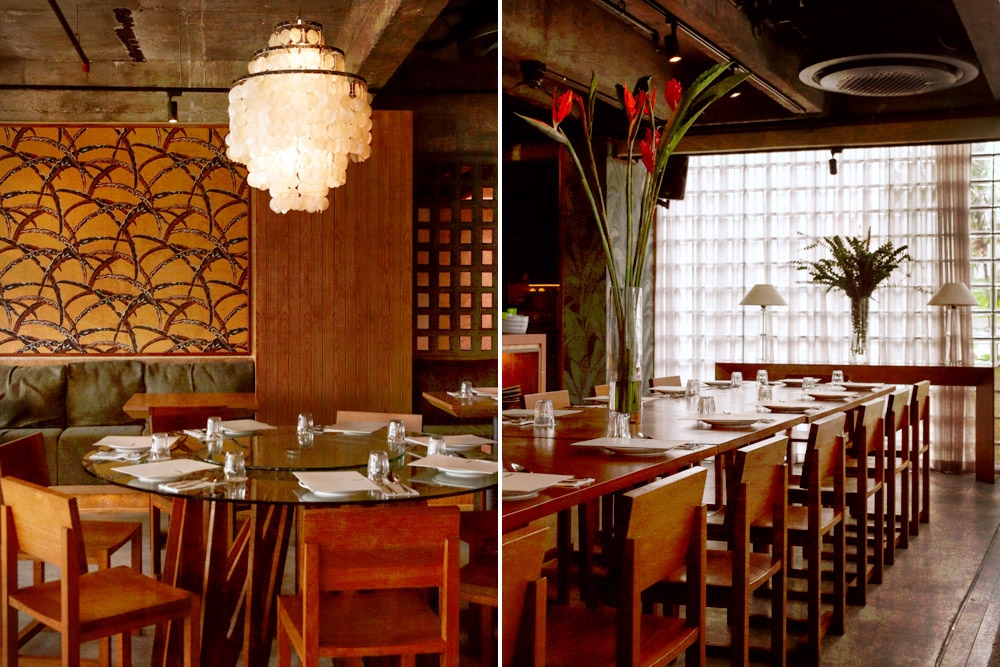
The space is warm and welcoming.
Working with local farmers and producers, he curates a menu where every plate speaks of its origins while offering a considered new perspective.
For newcomers, the Urap Pucuk Paku with Pegaga perhaps best distils the restaurant’s approach.
Fresh ferns (pucuk paku) and pennywort (pegaga) are joined by galangal, lemongrass, shallots and garlic. The herbs are prepped by hand, giving the salad a freshness that hums.
Local ingredients such as ulam and coriander roots feature prominently on the menu, the former lending the restaurant its name.
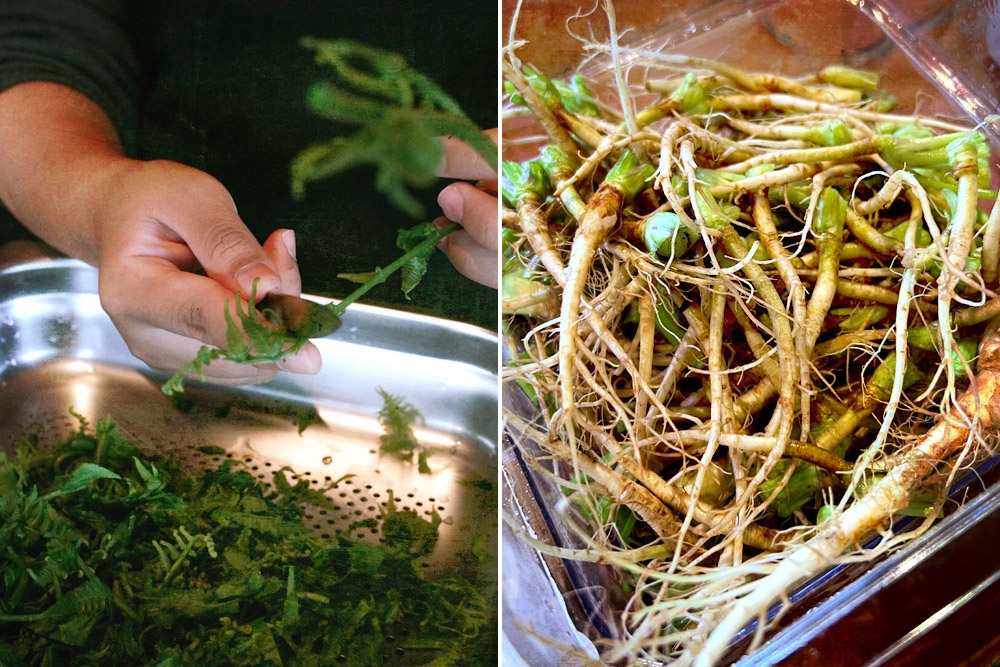
The menu features local ingredients such as ‘ulam’ (left) and coriander roots (right).
Chef Rakesh says, “It’s a nod to ulam, the Malaysian tradition of fresh herbs, which for us represents honesty, freshness, and flavours deeply rooted in tradition.”
He adds, “It also draws from Molam, the vibrant, funky Thai folk music we’ve been fans of for years. Together, they reflect what Oolam is about: staying true to South-east Asian flavours while having fun with how we express them.”
There is a certain rhythm to how Oolam’s plates arrive at the table, and a cadence to how the flavours open up – layered, sometimes surprising, yet always deliberate.
Chef Rakesh explains, “It embodies how we honour tradition while applying thoughtful, modern techniques. I insist on using tools like the pestle and mortar to retain the integrity of the ingredients – bringing out their natural textures and flavours in a way that machines can’t. It’s our way of respecting heritage, while pushing it forward with care and intention.”
That interplay of past and present is clear in the 48-hour slow-cooked Beef Short Ribs, smoked over burnt coconut husks for a depth that is earthy and primal. But it’s also visible in the way the restaurant approaches dining itself.
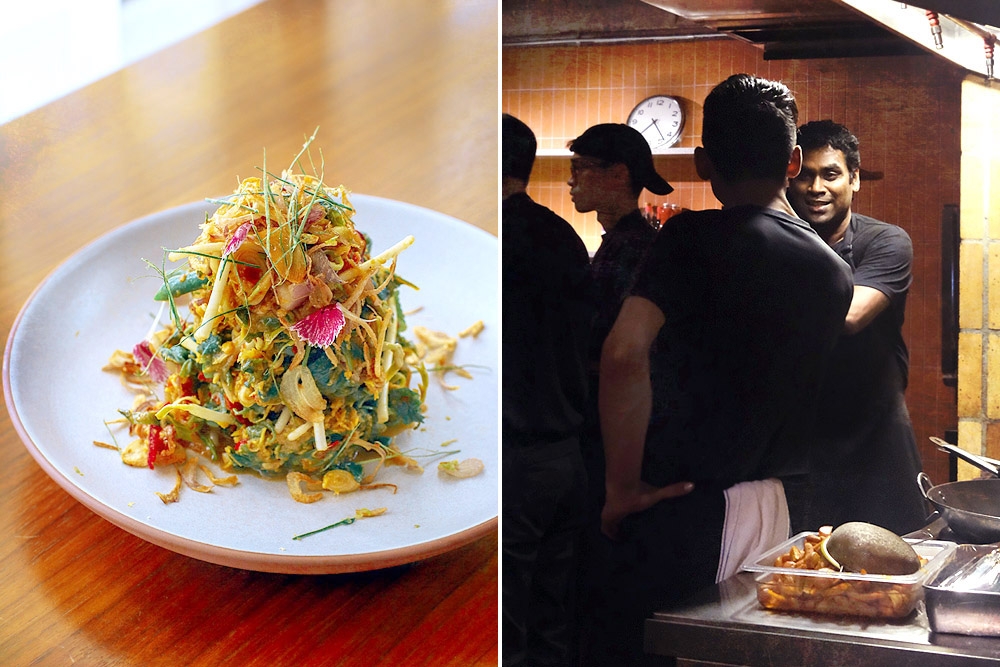
The kitchen team (right). 48-hour slow-cooked Beef Short Ribs (left).
“One memory that stands out is a night in Hanoi, sitting on low stools by the roadside, eating grilled beef and rice with friends,” Chef Rakesh recalls. “Around us, families were doing the same… laughing, sharing, connecting. That sense of togetherness, casual but deeply meaningful, is what we hope to evoke at Oolam.”
The space reflects this spirit: warm, welcoming, sidestepping the cold minimalism that marks many contemporary dining rooms.
Chef Rakesh says, “In South-east Asia, hospitality isn’t just about good service; it’s about welcoming people like you would into your own home and feeding them generously. The ambience, music and the way we host are all part of that.”
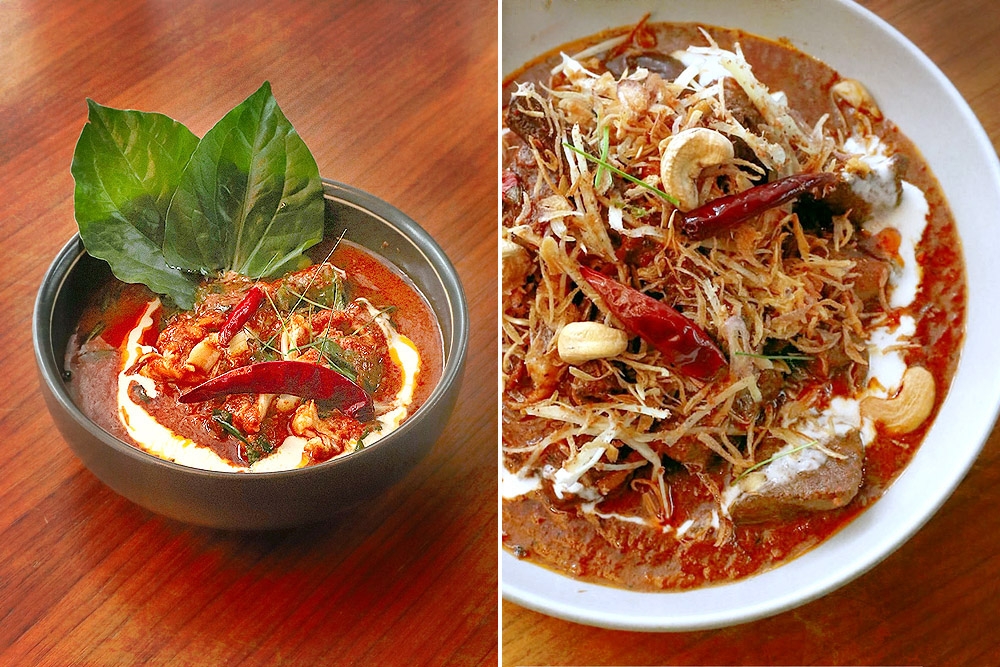
Oolam’s Crab Curry (left) and Massaman Lamb (right).
Modern Molam and Asian funk set the soundtrack, the playlist acting almost like an extension of the menu – rooted in tradition, with enough groove to keep things lively as dishes are served.
Oolam’s signature Crab Curry, made with fresh mud crab steamed with herbs and finished in a rich Isan-style curry, is a favourite. Yet the Massaman Lamb may surprise even seasoned diners.
The lamb yields with ease after hours in coconut milk, cardamom and cinnamon. Tamarind adds a dark fruitiness to cut the richness, while roasted cashews and peanuts offer a grounded, earthy note.
Desserts follow the same measured attention: Khao Niao Mamuang is an elegant take on the Thai classic; here it takes the form of mango Ice-cream served with sticky rice and sesame seed. Caramelised Bananas, bronzed and sticky with palm sugar, is paired with Smoked Coconut Ice Cream.
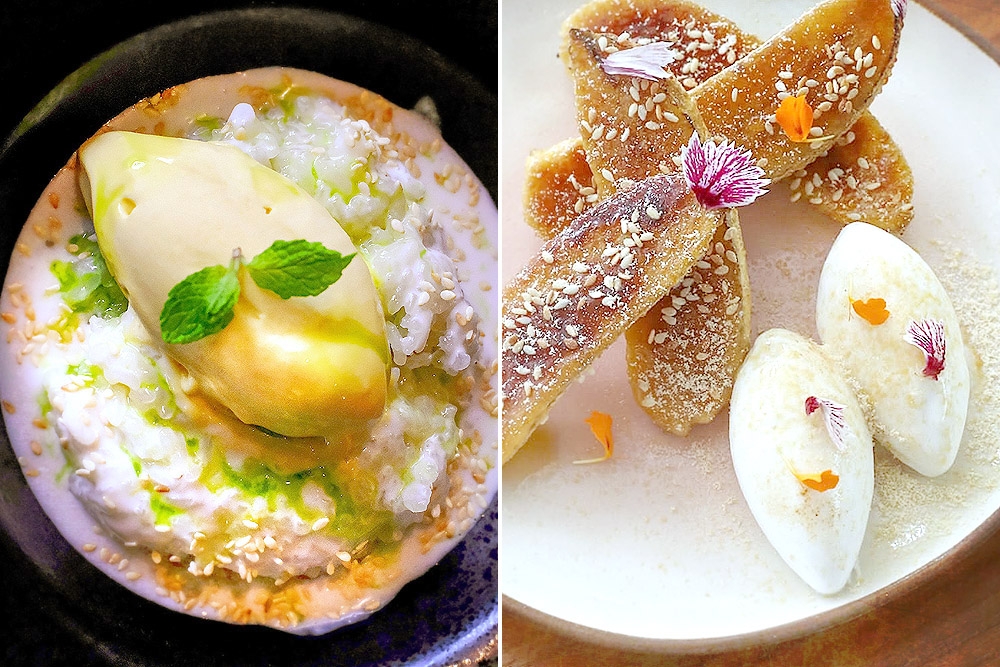
Khao Niao Mamuang (left) and Caramelised Bananas with Smoked Coconut Ice Cream (right).
Looking ahead, Chef Rakesh envisions Oolam as more than a single restaurant: “Our vision is for Oolam to grow into more than just a restaurant. It’s a platform for everyone to celebrate and champion South-east Asian culinary culture.”
That includes exploring the wider Nusantara region, from the fire of Isan cooking to the sweet depth of Javanese kicap manis.
Collaboration, he finds, “makes for a continuous learning experience for our team too, uncovering the rich layers of our neighbouring cuisines and exploring the threads that connect us all.”
Oolam, in this light, is not simply a place to eat – it is Chef Rakesh’s living letter to the region, an invitation to taste, reflect and share.
Oolam
E-1-03, Block E, The Five,
Jalan Dungun,
Bukit Damansara, KL.
Open Tue-Sun 6pm-10:30pm; Mon closed
Phone: 012-600 6170
IG: https://www.instagram.com/oolamdining/


